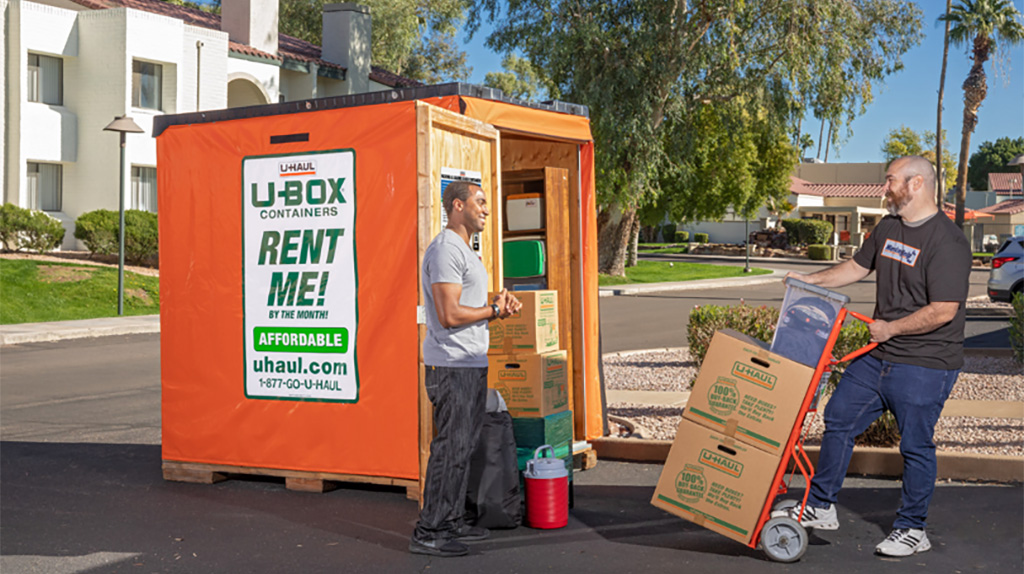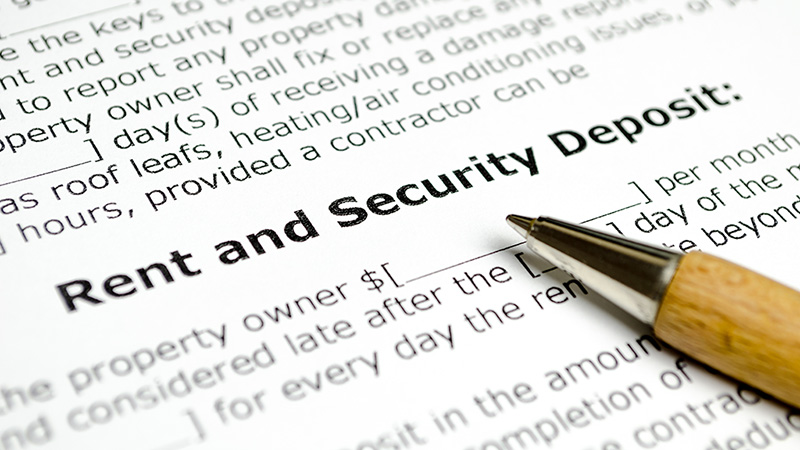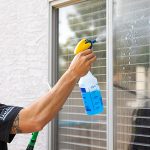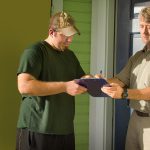Whether you move into your first apartment or fifth apartment, you’ll most likely have to put down a security deposit to secure your new home. A security deposit protects a renter and a landlord, which is why most places require them when signing a lease.
Moving Help® will guide you on what security deposits are, tips for getting them back, state-specific regulations, and what to do when you don’t receive your security deposit back.
What Is a Security Deposit?
A security deposit is money given to a landlord, lender, or seller of a home or apartment as proof of intent to move in and care for the home, according to Investopedia.com.
Depending on your lease, a security deposit can be refundable or nonrefundable. A refundable security deposit can be used to make sure the tenant takes care of the property they rent while living there. A non-refundable security deposit could be a pet deposit in case of pet damage by the end of the lease. Of course, tenants will want all the security deposits — whether refundable or non-refundable — in writing.
A security deposit can be used to pay for damage or lost property when a person leaves the home. If written into the lease, a landlord could keep all or a portion of your security deposit. If you leave the home in a good condition with normal wear and tear, you should receive your entire deposit back.
Planning for Security Deposit Return
If you plan on receiving your entire security deposit returned to you when you leave your rental home, you can take multiple steps even prior to living in your new home to ensure you receive the full deposit.
Taking Pictures and Videos of Your Rental Unit
Before you even place one moving box or one piece of furniture inside your home, take pictures and videos of everything inside your home. This includes the ceilings, floors, and walls. This way, you won’t get charged for preexisting damage.
For example, if the apartment has a hole that you didn’t create, you’ll want to document it now, so you’re protected when you move out.
Clean and Take Care of Spills
The best way to keep your security deposit is to clean your home yourself or hire someone to clean your home for you. By keeping a clean home, you won’t have as much dirt, grime, and clutter that could come back to haunt you when you move out.
You also should take care of any spills or accidents. If someone spills a beverage onto your carpet, or your dog has an accident on your hardwood floors, you should clean it right away. It’ll be easier to clean right away and less likely a stain residue will appear later.
Not sure where to start with your cleaning? You can check out our “Apartment Cleaning Checklist” article.
Reviewing the Lease and Giving Proper Notice
If you must break your lease, you’ll want to review your lease agreement. It should be written in your lease whether you forfeit some or all of your security deposit. If it’s not clear, contact your community’s manager or landlord.

If you plan to stay at your rental home for the duration of your entire lease before moving to a new home, you still must give proper notice to your landlord. Again, the question to, “How much notice do I need to give my landlord” can be found in your written lease agreement.
Some leases require 30 days of notice, others require 60 days of notice, and multiple leases require a different number of days before moving out of your apartment. If you don’t give enough notice, you might lose your entire security deposit because it could qualify as breaching your lease. Another concern is your landlord might auto-renew your lease because you didn’t give enough notice.
You’ll need to give a written notice to your landlord with a forwarding address written in your notice. The best way is to have it delivered certified mail with a return receipt request or to email it to your landlord requesting an email back confirming they understood and read your email. You also can use both options.
You want your notice to vacate to be written down. Even if you send an email, we recommend you create a Word document and attach it to the email, so there’s no confusion that your landlord missed it.
Be Present During Your Apartment Inspection
When you move out, your landlord will conduct an apartment inspection on your rental unit. While you’re not required to be present during the inspection, we highly recommend you be there.
This way, you can go over any comments or concerns your landlord might have about your unit. If you don’t like your landlord, this will help prevent them from pulling any shenanigans on you. You can try to see whether you can fix your apartment — such as repainting a wall back to its original color — without any money coming out of your deposit, and this will prevent any disagreement between you and your landlord when they might try to deduct from your security deposit.
If you conducted an apartment inspection with your landlord or by yourself when you first moved in, your landlord should use this same paperwork when reviewing your home. You also want to make sure you have all your pictures and videos of any preexisting conditions ready to go prior to your inspection date.
Cleaning and Maintenance Tips
While we talked about keeping up with your cleaning during your time living in your rental unit, you’ll want to consider a deep clean before you move out. A spotless home will make it more difficult for a landlord to justify keeping part of your security deposit for cleaning. Plus, they’ll appreciate it.
You have two options for a deep clean:
- Option 1. Clean it yourself: While this will be more cost-effective than Option 2, you’ll lose your personal time trying to clean everything yourself.
- Option 2. Hire cleaners: While you save your personal time, you’ll be shelling out more money to clean your space. Better yet, you could hire moving labor for cleaning from Moving Help. After they load your belongings, they clean your home as well if they offer both services.

If a light bulb went out, the A/C stopped working, something got clogged, pests invading your living space, or a smoke detector needs new batteries, make sure you fill out maintenance requests. When they’re fixed, you won’t have to worry about them during your inspection.
Other helpful tips prior to your inspection date includes:
- Get your rental in good shape by fixing any damages caused by you, your pets, or guests
- Possible fixes include patching holes or painting walls back to the original colors
- Return house keys, mail key, pool key, gate key, and other keys you originally received
- Remove everything when you leave, including garbage, food, cleaning supplies, and all belongings
State-Specific Guidelines for Security Deposits
Believe it or not, each state has its own laws and regulations when it comes to security deposits for how much landlords can charge, when the deposits need to be returned to the tenant, and other requirements.
Below is our handy-dandy chart for each state and the deadline for returning your security deposit to you based on the laws in each state.
Security Deposit Laws by State
| State | Deadline for return |
| Alabama | 60 days |
| Alaska | 14 days (with proper notification), 30 days (without proper notification) |
| Arizona | 14 days |
| Arkansas | 60 days |
| California | 21 days |
| Colorado | 30 days, (up to 60 days if specified in the lease) |
| Connecticut | 30 days |
| Delaware | 20 days |
| Florida | 15 days, (30 days if the landlord makes deductions) |
| Georgia | 30 days |
| Hawaii | 14 days |
| Idaho | 21 days, (30 days if stated in the lease) |
| Illinois | 30 days if landlord makes deductions, (45 days if the landlord returns the security deposit in full) |
| Indiana | 45 days |
| Iowa | 30 days |
| Kansas | 30 days |
| Kentucky | 30 days, (Up to 60 days if the tenant disputes deductions) |
| Louisiana | 30 days |
| Maine | 30 days if written/signed agreement, (21 days if tenancy at-will) |
| Maryland | 45 days |
| Massachusetts | 30 days |
| Michigan | 30 days |
| Minnesota | 21 days after your landlord receives a forwarding address |
| Mississippi | 45 days |
| Missouri | 30 days |
| Montana | 30 days, (10 days if no deductions are made) |
| Nebraska | 14 days |
| Nevada | 30 days |
| New Hampshire | 30 days |
| New Jersey | 30 days |
| New Mexico | 30 days |
| New York | 14 days |
| North Carolina | 30 days |
| North Dakota | 30 days |
| Ohio | 30 days |
| Oklahoma | 45 days |
| Oregon | 31 days |
| Pennsylvania | 30 days |
| Rhode Island | 20 days |
| South Carolina | 30 days |
| South Dakota | 14 days, (Within 45 days of an itemized accounting of deductions if requested) |
| Tennessee | 30 days |
| Texas | 30 days but you must give advance notice and include a forwarding address |
| Utah | 30 days |
| Vermont | 14 days |
| Virginia | 45 days, (Deductions must be itemized within 30 days, 45 days if charges exceed deposit amount) |
| Washington | 21 days |
| West Virginia | 60 days |
| Wisconsin | 21 days |
| Wyoming | 30 days |
You can find out more about your rights as a tenant by looking up the rental laws in your own state.
What to Do If You Don’t Receive Your Security Deposit
If you don’t receive your security deposit from your landlord within the timeframe of your state’s laws, you should follow up with your landlord — in an email, in a written letter, in person, over the phone. Written records are always best, especially if you need to go to court.
Whether you like your landlord or not, you’ll be more likely to get them to cooperate with you when you’re nicer to them. Yelling and screaming at them won’t help you in the long run to get your deposit returned.
As a last resort, you can take your landlord to a small claims court. Make sure you follow all your state’s laws, rules, and steps of contacting your landlord to return your deposit prior to filing a claim in a small claims court.
How to Get My Security Deposit Back
Depending on your circumstances, you’re entitled to all or part of your security deposit. You should be proactive in understanding what’s required when it comes to giving a security deposit before signing a lease. You should know what could or could not happen to your deposit.
By being proactive prior to living in your rental unit, during your lease, and when you move out, you’ll ensure to have a better chance to receive your full deposit back to you. You should take pictures and videos prior to moving in, cleaning spills and accidents immediately, giving proper notice with a forwarding address, deep clean your home, and be present during the apartment move out inspection.
You have a right to your security deposit, so it’s your responsibility you get your deposit back while following state-specific regulations. For other moving related help, you can read the Moving Help blog. Do you need moving labor? Find your perfect moving labor team with Moving Help today.




